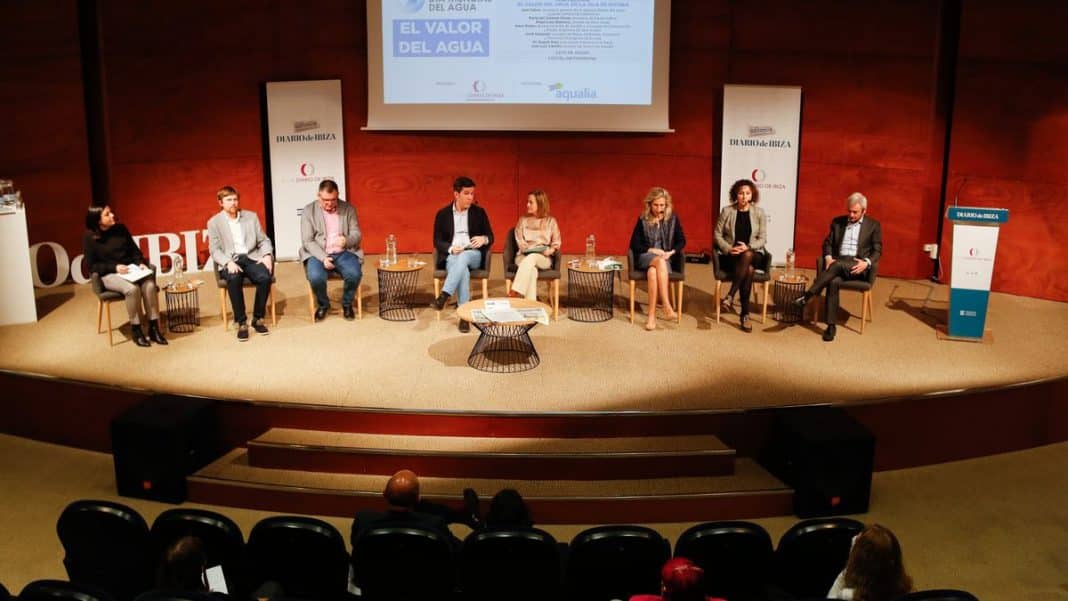The malfunctioning of the Vila water treatment plant and the delay in the construction of the new plant in sa Coma monopolized a large part of the debate on the value of water organized yesterday by the Club Diario de Ibiza and sponsored by Aqualia to mark World Water Day, which is celebrated today.
Juan Calvo, secretary general of the Balearic Water Agency (Abaqua), a public company of the Balearic Govern, acknowledged, in response to one of the repeated questions about the discharge of sewage from the obsolete Vile water treatment plant, that this issue represents “a failure as a society of the last 20 years”, which explains why “we have reached this point”.
Calvo explained that he has personally “apologized” to the affected neighbors and recalled that since the rainwater network is not separated from the sewage network in the city of Ibiza, when it rains, such a volume of water reaches the water treatment plant that the floodgates must be opened to prevent it from “breaking”.
He also pointed out that “the competent administration”, in reference to the Consell, did not warn the Ministry of Ecological Transition, which is responsible for the execution of the work, that there was a high probability of finding archaeological remains, as has happened, during the construction of the Sa Coma water treatment plant. The representative of Abaqua reported that the Ministry already has an archaeological plan budgeted at two million euros and is processing a modification of the project to resume the work.
The president of the Alianza por el Agua, Maria Àngels Marí, warned that the problem of the Ibiza water treatment plant “cries out to heaven” and “cannot be sustained”.
Most of the participants on the round table agreed on the importance of addressing the issue of wastewater treatment, as a key element in closing the water cycle. The president of the Alianza por el Agua explained that the organisation she represents works to promote “the culture of water” on the island. She recalled that it emerged after the severe drought of 2015, which was “a turning point” and that the majority of the population “opened their eyes” to the importance of conserving such a scarce resource. “We could not continue in the same way,” said Marí.
The mayor of Sant Josep, Ángel Luis Guerrero, explained the change in his municipality’s water policy since then. Whereas previously only 15% of water consumption was desalinated, it is now 100%. “There is no other solution than desalination,” said Guerrero, who nevertheless criticised the fact that if “good planning” had been carried out at the time, “one desalination plant” could have been built to supply the entire population of the island and not three, and thus “have avoided the environmental damage” that this entails.
Calvo did not avoid “the high energy cost” involved in desalination, but stressed that it has meant “salvation” for the island, since it has allowed it “to get out of the ICU”. However, the secretary general of Abaqua warned that it is necessary to be “more sustainable in the future” and stressed the importance of the Balearic Govern’s policy of encouraging the consumption of desalinated water in winter to recover the aquifers and have reserves for the summer peaks.
In this regard, the Councillor for the Environment of Sant Antoni, Neus Mateu, reminded Calvo that her City Council has requested 200,000 more cubic meters of desalinated water to absorb the reduction in consumption of groundwater, in compliance with the new municipal plan for sustainable water management.
The future of water treatment plants – The “uncomfortable” debate
Jordi Salewski, Vila’s councillor for the Environment and Town Planning, stressed that “technology can withstand anything” and, if it is considered, another desalination plant could be built, but that it is necessary to be very clear, given its economic and ecological impact, “how far we want to go”. “It is an uncomfortable debate,” Salewski highlighted.
The Mayoress of Santa Eulària, Carmen Ferrer, like the other municipal representatives, highlighted the important investments that have been made in recent years in the replacement of pipes and the digitalisation of meters to prevent “water leaks” from the network.
The director of Zone II of Aqualia, Juan Luis Castillo, stressed that all the municipal representatives “are very clear” about where the problems are and that the solution lies in “investing in the replacement of obsolete networks and the digitalisation of the control of the resource”. He then highlighted the Ministry’s announcement that “in the next few days” a first call for 200 million in European aid for digitalisation and modernisation of the water cycle will be published, which will require the concessionary companies to cover part of the budget for the projects. “We will have to race to secure this aid. We cannot continue to waste a resource for future generations”.
In his speech introducing the event, the president of the Consell, Vicent Marí, once again referred to the importance of Ibiza managing the complete water cycle and pointed out that the Consell is already “carrying out studies to ascertain the island’s situation and needs”.
For the full article, please visit Diario de Ibiza website here.

